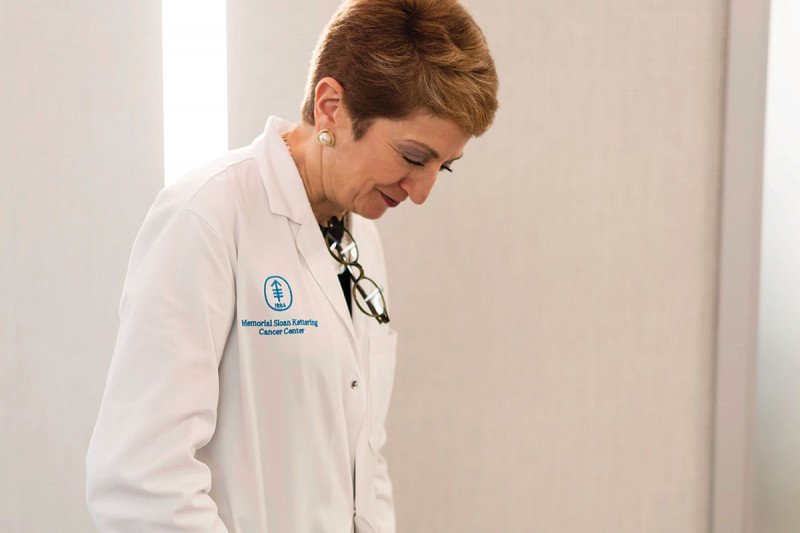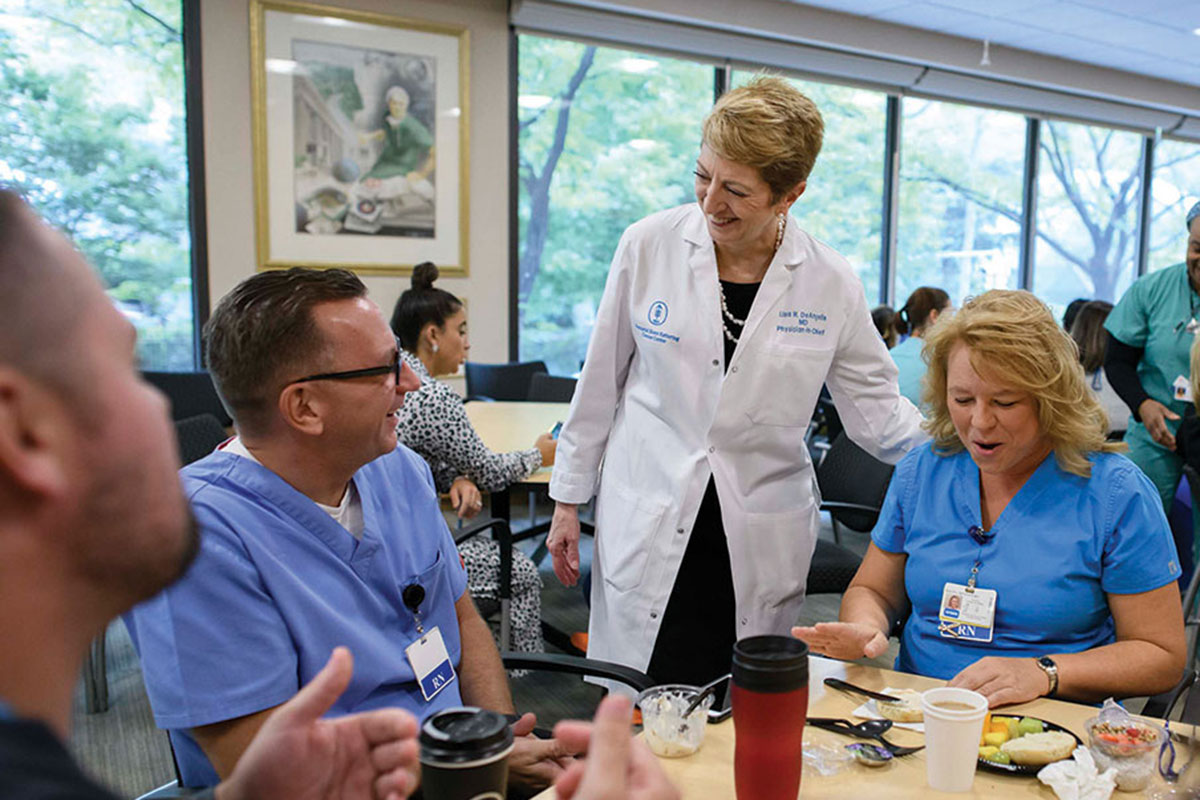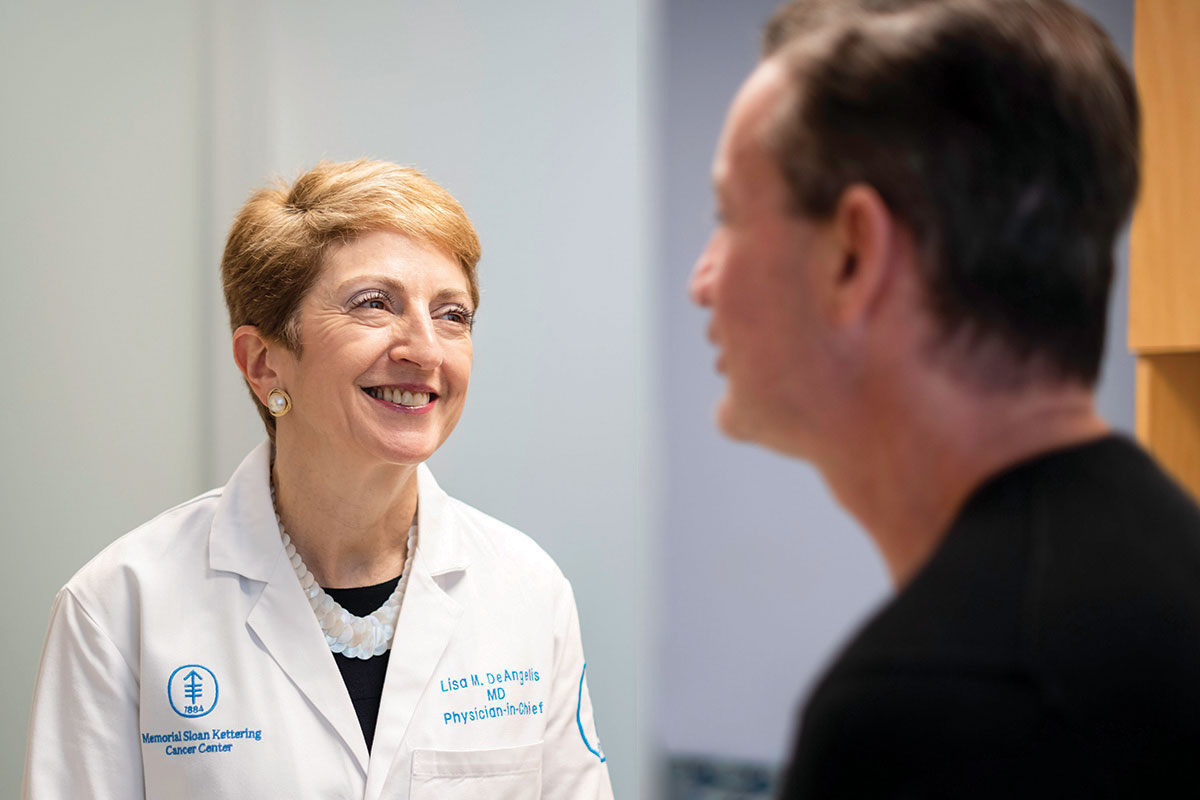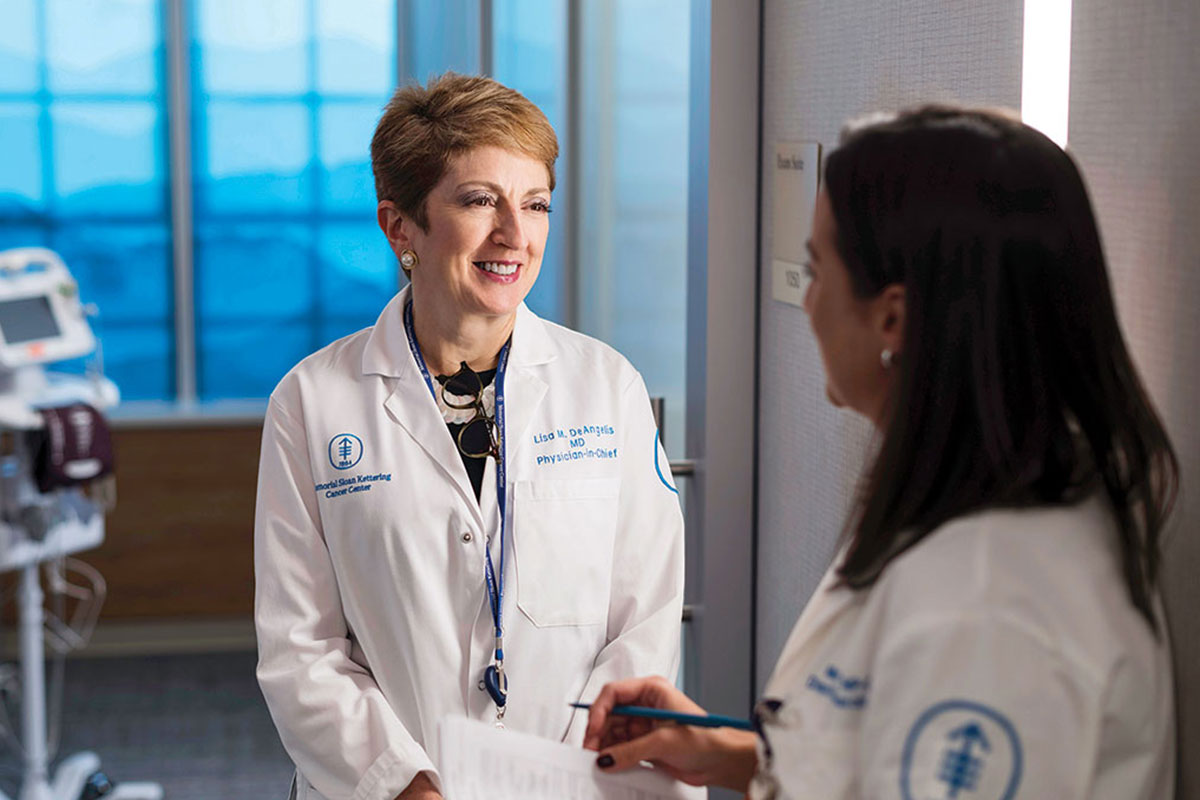
After more than 30 years at Memorial Sloan Kettering, Lisa DeAngelis still gets up at , goes to the gym if she’s feeling ambitious, and walks to and from work with her husband, Peter Okin, a cardiology specialist at nearby Weill Cornell Medicine.
Though her morning routine hasn’t changed, her role at MSK has. In September 2019, she took on nearly endless responsibilities when she was named MSK’s Physician-in-Chief and Chief Medical Officer. She now directs MSK’s entire clinical effort, overseeing the care of MSK’s patients at 20 facilities spread across New York and New Jersey, including a 500-bed inpatient hospital.
Few people know as much about MSK as Dr. DeAngelis. During her tenure, she was Chair of the Department of Neurology, co-founded the Brain Tumor Center, conducted clinical research that helped set the standard of care for central nervous system lymphoma, and served as Acting Physician-in-Chief for 12 months before the role was made permanent. We followed along with Dr. DeAngelis to learn more about where she sees the institution heading and to get a sense of what it’s like to walk in the shoes of the Physician-in-Chief.
7:30 a.m. Monday: Meet and Greet Breakfast with Nurses
Dr. DeAngelis stands near a table crowded with breakfast treats as MSK nurses fill a conference room at Memorial Hospital. This is one of several special events set up for faculty to talk with the new “PIC,” the insiders’ nickname for the Physician-in-Chief. A nurse who works the overnight shift says, “I stayed late just so I could wish her the best.”
Some nurses are meeting Dr. DeAngelis for the first time, while others reminisce with her about patients they cared for together.

“We all broke out cheering when we heard you were named Physician-in-Chief,” a nurse tells Dr. DeAngelis, as the group around them enthusiastically agrees.
Dr. DeAngelis reflects, “I’m really honored and thrilled that nurses and other faculty members view this as something we’re in together. The only way to accomplish things here is to work closely with the faculty and staff.”
She finds a moment for a few quick bites from a cup of yogurt, then moves from table to table, asking people about their work and what they hope to see at MSK. “Nurses are the heart and soul of MSK,” she says. “When I started here as a fellow in 1985, I realized I had a huge amount to learn from MSK nurses, who are simply outstanding. They are often the glue between doctors and patients and their families.”
12:30 p.m. Tuesday: In Clinic
Dr. DeAngelis sits down on a rolling stool so she is eye to eye with James Perri, who has been coming to see her for more than 20 years. He was diagnosed at age 24 with oligodendroglioma, a rare tumor of the central nervous system. As he does every few months, he flew from his home outside Charlotte for today’s appointment.
They chat easily about their field — he is an emergency room doctor — and their children, and share anecdotes about Boston, where Dr. DeAngelis’s son is doing a clinical fellowship as he trains to be a physician-scientist. But the connection between doctor and patient runs much deeper than familiarity.
“She was not the first doctor I went to after being diagnosed,” James says. “But once I started seeing her, I knew she was incredible, and I’ve been with her ever since.”
“For me, it’s essential to remain connected to patients and families, and to remember why we’re here,” Dr. DeAngelis says. As Physician-in-Chief, she oversees the care provided by more than 1,200 attending physicians and nearly 4,000 nurses across MSK. Dr. DeAngelis says that remaining hands-on gives her invaluable insights. “I want to stay connected to the operations of the institution,” she says, “and I want to personally grapple with challenges we face, such as electronic medical records,” which some clinicians believe are too time-consuming and distract from their face-to-face connection with patients.
Improving the clinical experience is Dr. DeAngelis’s top priority for the first year in her new role. “I think understanding the stresses our faculty and staff are under will improve patient care and also help our research and education efforts,” she says. “Everything flows from that.”
A particular focus will be on burnout, which research suggests is high across the healthcare industry. “Burnout can affect physicians, nurses, and others. It impairs their ability to do their job, and it robs clinicians of their pride in helping people. Finding ways to alleviate the stress they feel is important to fulfilling our mission,” she says.

4:30 p.m. Tuesday: President’s Research Seminar
As Physician-in-Chief, Dr. DeAngelis helps oversee MSK’s world-class clinical research efforts. These investigations of new therapies are closely integrated with the basic and translational research conducted at the Sloan Kettering Institute. At this event, Dr. DeAngelis watches as MSK President and CEO Craig B. Thompson introduces a presentation by Maria Jasin of SKI. Dr. Jasin is the featured speaker at the President’s Research Seminar, a biweekly series in which eminent scientists present their research as part of MSK’s Continuing Medical Education program.
“I think SKI and the hospital have never been as well integrated as we are now,” Dr. DeAngelis says. “You can make observations in a basic science laboratory and then see how it applies to human disease. There is an enormous engine of collaboration between us that helps us understand and identify cancer’s vulnerabilities.”

Dr. DeAngelis is especially enthusiastic about MSK’s continuing momentum in immuno-oncology. This involves using the body’s own immune system to fight cancer. She is also a proponent of precision oncology, which targets specific mutations that drive cancer growth.
And she sees promise in areas that, she says, “are a bit earlier in their development, such as theranostics,” which can diagnose and treat cancer simultaneously. “For instance,” she says, “we now have agents that target neuroendocrine tumors and can deliver radioactive elements directly to the cancer cells while reducing toxicity to normal tissues.”
A key to these efforts is the people who support MSK, says Dr. DeAngelis: “Generosity by so many donors has enabled us to build wonderful programs in basic, translational, and clinical research that fuel the identification of new therapies for patients.”
5:30 p.m. Monday: Reception for New Attending Physicians
At a reception for new attending physicians, Dr. DeAngelis joins the whirl of banter that mixes small talk with medical terminology. The reception follows an orientation for new doctors at MSK. The event helps them meet clinicians outside their own fields to build personal connections that help patients and boost morale.
After more than 20 years in leadership at MSK, Dr. DeAngelis has learned not to give advice when younger clinicians ask for it. “Instead,” she explains, “I ask questions. What kind of career do you want? What’s fulfilling to you? Once we can articulate that, I might be able to provide some guidance. But I try never to tell people what they should or shouldn’t do in their careers.”
She does, however, have a very definitive answer about her favorite part of her new role. “I am getting to know so many of the faculty across the full spectrum of the organization,” she says. “Obviously, I’ve been here a long time, so I certainly knew many people. But I’m getting to know the scope of what people do in a completely different way. That is awe-inspiring. That is unquestionably the best part of the job.”
And it provides food for thought as she ends her very long days with a brisk walk home, a cherished ritual in a career devoted to helping the people of MSK.